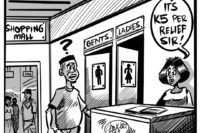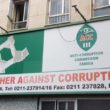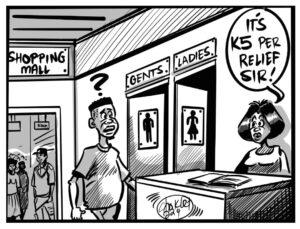The Anti-Corruption Commission (ACC) has closed the case against a Ministry of Finance official who allegedly owned 48 housing units recently forfeited to the State on grounds that the matter lacked evidence linking him to the said properties.
And the Commission says President Edgar Lungu decides how to deal with his appointees under investigation for corruption.
ACC acting Director General Rosemary Nkonde Khuzwayo revealed this during ZNBC’s Sunday Interview programme after host Grevazio Zulu asked her to give an update on the seized houses suspected to be proceeds of crime.
She said no one had declared ownership of the said properties after publication of a gazette while the person in whose name the properties were registered has equally disowned them.
Because of this, Khuzwayo said, the matter cannot go to court for prosecution in the absence of sufficient evidence while tenants occupying the completed houses have been informed to start paying rentals to the ACC.
“When we became aware of that gentleman, the one we thought was the owner of the flats, investigations were directed at him. But in the course of the investigations, it was clear that those flats were not in his name. So, what we did as ACC, using disposal regulations, we publicized the gazette that we had seized those properties and we named a number of people and institutions that we thought had anything to do with ownership of those properties. That was done last year in August, but by April this year, no one had come forth to claim that those properties were theirs, including the person that we had initially thought owned them,” Khuzwayo explained and said the matter had since been closed. “And the person in whose names those properties were in when interviewed, he disowned the properties, he said they were not his. So, when we finally forfeited them in April this year…”
But Zulu wondered if closing the case was not such a simple way of dealing with the matter, to which Khuzwayo said the Commission was within its mandate to do so.
“What we did, as ACC, is within our mandate; the law allows us to proceed the way we did. So, whatever we did is within the law. But in terms of ownership, initially I said that at the commencement of these investigations, we had someone in mind whom we pursued. But along the way, he refused ownership; he denied having ever owned those flats. So, even if we went to court, there is no document that is in his name, the documents are in the name of someone else. But when [we] interviewed everybody, including the person whose name the flats are in, he denied ownership and I don’t want to mention his name. But if he’s watching this programme, he knows himself. We called him for interviews, the records are there. If someone is allowed legally to read our docket, they would be able to see that we did everything by the book,” Khuzwayo explained.
When asked if closing the matter in such a way would not inspire other Zambians to steal with impunity and later on just deny the allegations, Khuzwayo said as a qualified prosecutor, she was satisfied with the action that the Commission took.
“For me who is a lawyer and a prosecutor, I am asking myself, if we took him to court, there is nothing in his name and he refuses ownership, so how would we prove that those things were ever his? And the person in whose names those flats were denied ever knowing about them, what he explained was that someone asked for his NRC copy; he gave them and the next thing he knows is that ACC is on his case because some properties in Lusaka are in his name…” she said.
Meanwhile, Khuzwayo said the Commission is facing difficulties in investigating officers appointed by President Lungu because the amended Constitution was “silent” on whether or not the ACC Act applied to them.
“The ACC demands that someone who is being investigated needs to be suspended, although the ACC Act talks about a public officer. But if you have had a look at the [amended] Republican Constitution of 2016, I think you would know that there is a problem in terms of who a public officer is. So, I think for people that the President needs to suspend when ACC is investigating, I think there is a problem in whether or not that section of the ACC Act also extends to that class of people. But for the other classes of people that the President needs not to deal with, the definition of ‘public officer’, I think there is no problem there,” she said.
“So, it’s up to the appointing authority, I think, on how to decide how to deal with that suspect. I think I don’t want to dwell so much on the people that the President has to personally deal with in terms of that section of the ACC Act.”
Khuzwayo further dispelled assertions that the Commission was politically controlled.
“If we had political pressure, how did we manage to prosecute a sitting (Cabinet) Minister? How do we manage to prosecute high-ranking government officials? If we were, I don’t think we would manage to do all this…If people are sincere, they would agree that even for cases, we lose and win some…So, it’s give and take,” she argued.
And Khuzwayo said the ACC did not understand why people were not reporting corruption when the perception was that the vice was rife in Zambia.
“The ratings that Transparency International (TI) gives for all the countries are a reliable barometer of measuring corruption. However, when we look at the number of allegations or complaints that we get, the numbers do not correlate with the ratings or the figures that TI gets to give us in a year that they do the CPI (Corruption Perception Index)…,” said Khuzwayo.
“…when it comes to ACC, we rely on the figures that we have in relation to how many complaints we get and the records we have at ACC are totally different from what TI is giving us. But as ACC, we have noted that people are not reporting as much as they were reporting before, so it’s a bad sign. We don’t know why people are not reporting corruption.”













9 Responses
Ba Madam, the owner of the 48 houses is Chitotela. Why shield him. Those tenants were paying rent to the ghosts. Who are you fooling madam corrupt commissioner?
What a joke
Who can believe this nonsense ? Honestly the ACC are telling us that they failed to find the owner of those properties! what a joke and why are they not telling the public the name of that person who refused his own properties? Rosemary your fooling Zambian people and lowering yourself.
Madam is not honest. She probably needed to say “investigations were halted by higher authorities” who has been receiving rentals? Can we get records from Lusaka city council and see who owns the plots. Justice is surely not for the poor.
This is very shameful,madam what kind of a lawyer and prosecutor are you who fails to investigate a case of such a magnitude.You simply say you have failed to come up with the owner of those 48 houses and you think the public will relish your nonsense?For you information we are talking about tax-payers money which have been stolen buy indivituals who are in government.Nkonde with your friends at ACC you are misfits and you should resign on public interest.Why did go to the Lusaka City Council and the person who owns those houses?Or is it that Lusaka City Council is not being helpful?2021 comes quickly so we can weep the theives.
Ridiculous. Who do the tenants pay rent to?
ACC senior officials are complicit in most of the corruption by members of the Executive, Judiciary and Legislative wings of government including some senior civil servants in the ministries and some parastatal institutions. This woman has no shame at all. Jean Kapata at Lands ministry is on rampage, her greedy and thieving has reached epic levels. No one knows what she’s gonna become between now and 2021. One wonders why the head of state is not acting on his numerous pronouncements about dealing with his corrupted thieving government ministers. It is obvious that he’s afraid to get rid of these thieving ministers, why, only he knows why? One can but only conclude that may be he’s party to the corruption matrix.
To whom were the rentals paid before you seized them? With whom did the tenants sign the tenancy agreement? Bufi this woman is not telling the truth but one day we shall know the truth and punish all the criminals.
Very simple, how did his name find itself on the title deeds?